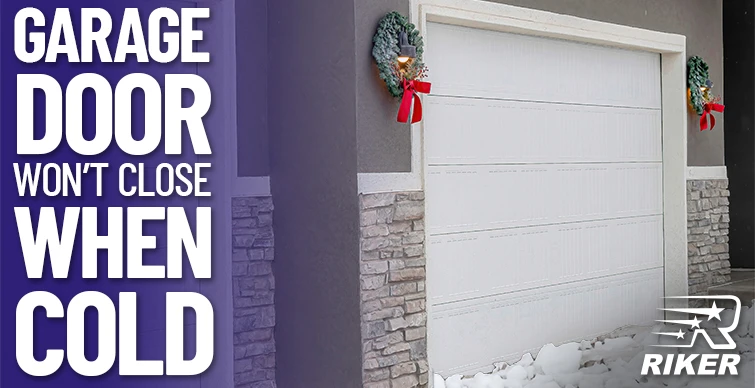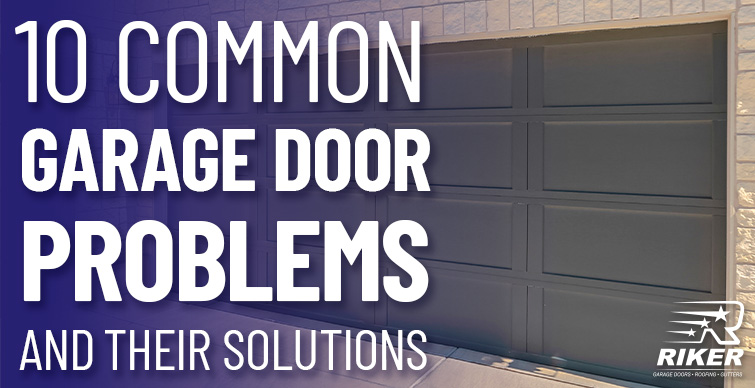Winter temperatures can have a surprising impact on your garage door, especially if your garage door won’t close when cold weather sets in. Many homeowners experience issues where their door becomes unreliable or refuses to close altogether. The drop in temperature can affect the mechanical components and safety sensors.
Here’s a look at the common reasons your garage door might struggle in winter and what you can do to address each problem.
Table of Contents
Common Reasons Your Garage Door Won’t Close in Cold Weather
Cold weather can disrupt your garage door’s normal function in multiple ways. As the temperature drops, metals used in springs, tracks, and other parts contract, which can lead to alignment and movement issues.
Moisture buildup from frost and snow can also hinder sensors or cause the door to stick.
Additionally, lubricants and weatherstripping materials react to temperature changes, often hardening and losing their flexibility.
Contracting Metal Components
In cold weather, metal parts like springs, screws, and tracks can contract, leading to increased friction and possible misalignment. These components depend on a smooth, coordinated movement to operate effectively, but when contraction occurs, the door may struggle to open or close properly.
Lubricating all moving parts with a winter-grade garage door lubricant is a practical way to counteract friction and ensure smoother operation throughout the colder months.
Faulty Safety Sensors
Safety sensors, which are crucial for preventing accidents, are especially vulnerable to winter issues. If temperatures drop, the ground or track may shift, resulting in slight misalignments that prevent the door from closing. Snow or ice buildup on or near the sensors can further block the safety beam, and condensation can fog up the sensor lenses, reducing their ability to function.
Ensure that your sensors are aligned, clean off any buildup or frost, and wipe away condensation to maintain their effectiveness.
Stiff or Worn-Out Weatherstripping
Weatherstripping at the bottom of the garage door is designed to seal the gap and prevent drafts, but it can stiffen or crack when exposed to cold temperatures. This resistance can make it harder for the door to close fully and add strain to the motor.
Check your weatherstripping for signs of stiffness or damage, and replace it with winter-resistant material if necessary to avoid these issues.
Lubricant Hardening on Tracks
Lubricants that work well during warmer months may not be suitable in winter. Many types of lubricant harden in cold temperatures, making it difficult for rollers to glide along the tracks. Cleaning the tracks and switching to a silicone-based lubricant, which performs better in low temperatures, can help keep the door moving smoothly.
Misaligned Tracks
Temperature shifts from day to night can cause small adjustments in your garage’s structure, sometimes leading to misaligned tracks. This misalignment disrupts the path of the garage door, making it hard for the door to close completely.
To keep the door functioning properly, check the alignment of the tracks, and if needed, make adjustments carefully or consult a professional.
Issues with Garage Door Springs
Garage door springs, which bear most of the door’s weight, can become brittle and lose their effectiveness in cold weather. This lack of tension means the door might not have enough power to close smoothly. If you suspect the springs are compromised, contact a professional garage door repair company, as handling springs under tension can be dangerous.
Remote Control Issues
Remote controls often experience reduced battery life in colder temperatures. Additionally, frost on the garage door opener’s antenna can weaken the remote’s signal, causing a response delay. To address this, replace the remote’s batteries if they seem weak, and ensure the opener’s antenna is free of frost or debris. If that doesn’t work, try requesting a garage door opener repair service.
Frozen Garage Door
In especially cold and damp conditions, a garage door can freeze to the ground, preventing it from opening or closing. This situation occurs when ice forms beneath the door, creating a seal between the door and the floor. If this happens, carefully remove any ice from under the door, and consider applying a de-icing solution or using rock salt to prevent refreezing.
When to Call a Professional if Your Garage Door Won’t Close When it’s Cold
While some of these winter-related garage door issues can be managed with basic maintenance, others might require the expertise of a professional.
If your door continues to misalign, if springs seem brittle, or if track adjustments aren’t resolving the problem, it may be time to call in help.
Professionals have the tools and experience to handle these challenges safely and ensure your garage door works reliably through the colder months.
Call Riker Home Services to Repair Your Garage Door
If your garage door is giving you trouble this winter, don’t let the cold weather leave you stranded. Riker Home Services, a trusted garage door company in Plano, provides professional, reliable repair and maintenance services throughout the Dallas-Fort Worth area.
In addition to repairs, we also offer expert garage door installations in Plano and beyond, as well as comprehensive garage door maintenance for homes across DFW. From sensor adjustments to spring replacements and everything in between, our experienced team is here to keep your garage door functioning smoothly, even in the coldest months.
Contact Riker Home Services today by calling (469) 551-3473 to schedule a service and ensure your garage door is ready to withstand the North Texas winter weather.


